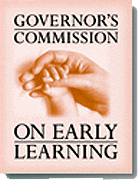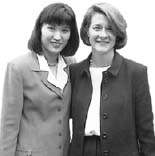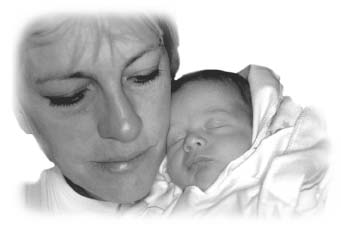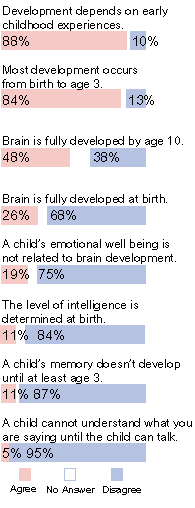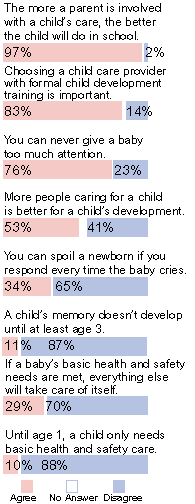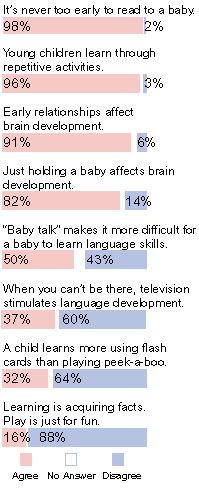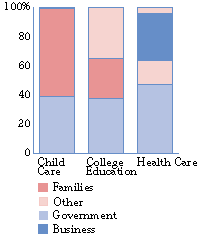|
Mona Lee Locke, Commission Co-Chair
First Lady of the State of Washington
Olympia, Washington
Mrs. Locke is the spokesperson for Washington State Sudden Infant Death Syndrome
(SIDS) Foundation; honorary chair of the Washington SAFEKIDS Coalition; advisory board member
of Mothers Against Violence in America (MAVIA); and honorary co-chair of Healthy
Mothers, Healthy Babies. Mrs. Locke graduated from the University of California in English literature
and earned a master's degree from the Northwestern University Medill School of Journalism.
She has worked as a television news reporter in Washington DC; Green Bay, Wisconsin; and
Seattle, Washington. Mrs. Locke and Governor Gary Locke have two young children.
"I'd like to thank my daughter Emily for drawing my attention to early
learning; and making me realize that giving a child that early start in life is not only vital
for the success of an individual, but vital for the success of our state."
—Commission Meeting, June 26, 1998
Melinda French Gates, Commission Co-Chair
Co-Founder Bill and Melinda Gates Foundation
Seattle, Washington
Mrs. Gates and her husband, Bill, founded the Bill and Melinda Gates Foundation. The goal
of the foundation is to support innovations in education, technology, and world health.
Mrs. Gates graduated from Duke University in computer science and economics, and earned
a master's degree from the Duke University Fuqua School of Business. She developed a
variety of multimedia products for Microsoft. Mrs. Gates retired in 1996 to care for her two
young children.
"When Mona called me up about this Commission…it was our passion for
the topic and our passion for our own children that drove us to want to do
something in Washington State. …We have the shared goal, making sure that children are prepared to succeed."
—Commission Meeting, June 26, 1998
Dr. Kathryn E. Barnard, R.N. Ph.D.
Professor of Nursing and Adjunct Professor of Psychology, Affiliate,
Center for Human Development and Disability, University of Washington
Seattle, Washington
Dr. Barnard has conducted research in child health assessment, early intervention with
at-risk infants and families, and parent-child interaction. She worked on the 1994 study of care
for young children in the United States: Starting Points, Meeting the Needs of our Youngest
Children [Carnegie Corporation of New
York]. She helps mothers and families in poverty or
emotional trauma learn parenting skills.
"I want to help parents understand the importance of infancy in development of the brain and behavior. We bear an enormous responsibility to ensure that care is optimal for children"
—Commission Meeting, August 18, 1998
Senator Lisa J. Brown, 3rd District
Ph.D. Economics, Eastern Washington University
Spokane, Washington
Senator Brown has served two terms in the House of Representatives and one term in
the Washington State Senate. She is interested in the changes our economy has gone through
and the impact this has had on families and children. Senator Brown has one son in elementary school.
"It has long been my belief that equality of opportunity is one of the key values
of our society. But equality of children is limited, if children come into the
school system at the age of five with widely varying resources and opportunities."
—Commission Meeting, June 26, 1998
Don C. Brunell
President, Association of Washington Businesses
Olympia, Washington
Mr. Brunell's organization represents about 3,700 businesses around the state, and he has
been president since 1988. He also serves on the Executive Committee for the Foundation
for Private Enterprise, the Washington Roundtable Economic Climate Committee, the
Governor's School-to-Work Task Force, and the Board of Directors of the National Association of
Manufacturers. Mr. Brunell has six children and three grandchildren.
"Most of our folks gave us a lot of love and we owe it to our kids to do the
same. So whatever we can do to help… educate our kids better, so that we have
caring concerned business leaders in the future, is really what we are
here about."
— Commission Meeting, August 18, 1998
Craig W. Cole
President and Chief Executive Officer, Brown and Cole Stores
Bellingham, Washington
Mr. Cole's retail grocery firm employs about 2,500 people throughout Washington and is
a leader in family friendly business practices. Mr. Cole is a former local elected official,
university trustee, and has been on many boards and commissions related to youth and families.
"My main interest is how we can support parents. I am very sympathetic
with those who find it difficult to figure out how to best raise children. It is not an
easy task. In fact, it is the hardest job I have ever had."
— Commission Meeting, August 18, 1998
Kim Cook
Regional Director District 925, Service Employees International Union
Seattle, Washington
Ms. Cook's organization represents professional, technical and office support staff,
including librarians, accountants, social service providers, and other professions. She is working
with child care providers and teachers to form a union to reduce turnover through fair wages.
"We work with parents to help them find good care, to figure out what quality care is and how to afford it. There is a 40 percent turnover rate in this field. We need to find a way…to train and keep good teachers."
—Commission Meeting, June 26, 1998
Senator Alex Deccio, 14th District
Ranking Republican, Chair Senate Health and Long Term Care Committees
Yakima, Washington
Senator Deccio has served three terms in the State House of Representatives, and four terms
in the Washington State Senate. He has been a Yakima County Commissioner, and served on
the Yakima Chamber of Commerce and Yakima Community College Board of Trustees. Prior
to public service, he was in the insurance industry.
"My wife and I raised eight children and have 14 grandchildren, and one great grandchild; there are two teachers and four nurses in our family. So our family is very involved in early childhood."
—Commission Meeting, June 26, 1998
Robbin Dunn
Program Director, Educational Service District 113 Head Start/Early Childhood
Education and Assistance Program (ECEAP)
Olympia, Washington
Ms. Dunn works to improve programs for young children and strengthen the ability of
families to care for their children. She has helped with developing statewide program
regulations, standards, and procedures. In 1998, she served as President of the Washington Association
of Head Start and Early Childhood Education and Assistance Program.
"We work with over 20,000 of our state's most vulnerable families. I hope the Commission will build on what works well and take a leadership role in helping us invest where we can make the greatest difference and spend our resources wisely."
—Commission Meeting, June 26, 1998
Sheri Flies
Attorney at Law, Corporate Council, Costco Wholesale
Issaquah, Washington
Ms. Flies is the Costco coordinator of the private/public collaborative partnership with
Bellevue Community College to build the Early Learning and Child Care and Family Center. Ms. Flies
is the mother of two children.
"Public/private partnerships which include business, parents,
education, and government are one of the best ways that we can improve
child care and strengthen families."
—Conversation with Executive Director, April 28, 2000
Peter A. Jackson
President and Chief Executive Officer, Foundation Northwest
Spokane, Washington.
Mr. Jackson has extensive experience in nonprofit funding, reviewing grant applications,
and grant management. His organization creates opportunity and self-sufficiency through
education, and supports human services in east Washington State.
"Creating economic opportunity and self-sufficiency is one of our goals. Even if we had a billion dollars to give away, it would never be enough to solve these problems."
— Commission Meeting, August 18, 1998
Martha W. (Marty) Jacobs
Executive Director, Washington Association for the Education of Young Children
Seattle, Washington
Ms. Jacobs has worked in clinical services, research, and child care training for care givers
and families. Ms. Jacobs' organization is the professional association for early child care
educators. It supports children's issues through advocacy, training, and interaction with other
organizations.
"I have a 12 year-old who was in a very good, high quality, child care program in Seattle. There are many things he does now…that I can attribute to that program. So, I have seen in my own life what a child care program can do."
—Commission Meeting, June 26, 1998
Representative Lynn Kessler, 24th District
House Democrat Leader
Hoquiam, Washington
Representative Kessler is serving her fourth term in the Washington State Legislature.
She hopes to be a link to the Legislature for developing policy and funding. She has been
Director of United Way of Grays Harbor, and is Chair of the Grays Harbor Board of Trustees, and
Grays Harbor Economic Development Council. Representative Kessler is a member of the
Rules, Executive Rules and Appropriations Committees in the House of Representatives.
She and her husband, Keith, have three sons and one daughter.
"I hope we can start thinking of children as children; and not poor
children, middle class children, and rich children. In this materialistic society…I think
that is an important conclusion to come to."
— Commission Meeting, August 18, 1998
Mary Ellen O'Keeffe
Dean, Health and Human Services, Edmonds Community College
Seattle, Washington
Dean O'Keeffe has developed parent/child programs, family support systems, and
family friendly policy for employees. She currently chairs Family Support Washington and the
King County Children and Families Commission. Ms. O'Keeffe also serves on the boards of
the Children's Trust Foundation and the Children's Campaign Fund.
"I was the mother of a newborn and a two year-old. I must say that studying child development wasn't nearly as helpful as having a lab to go to once a week and get support as a parent. I have worked…to create environments that support very young parents and their children in the very beginning years from birth to three."
—Commission Meeting, June 26, 1998
Scott D. Oki
Chief Volunteer, the Oki Foundation
Chairman and CEO, Oki Developments Inc.
Bellevue, Washington
In 1986, Mr. Oki and his wife established the Oki Foundation to support welfare and
education of children. He also established Oki Developments, a multifaceted investment company.
Mr. Oki retired from Microsoft, where he founded the International Division and was Senior
Vice President, Sales, Marketing, and Service. He is a past president and member of the University
of Washington Board of Regents and serves on dozens of nonprofit boards. Mr. Oki has three children.
"To marry my passion for things entrepreneurial with things philanthropic in ways that encourage others to do the same."
— Personal Mission Statement
Dee Ann Perea
Parent Education Instructor, Bellevue Community College
Issaquah, Washington
Mrs. Perea teaches Parent Education classes for families with one, two and three year
old children. The program serves approximately 1400 families and is dedicated to
understanding children of all ages. She is a member of the Eastern and Western Washington chapters of
the National Association for the Education of Young Children. Ms. Perea and her husband have
a student in high school student and one in college.
"I was an elementary school teacher and I was asked to teach a class
on…parent conferences. That led me to see how much I enjoy working with parents."
—Commission Meeting, June 26, 1998
Jim Sinegal
President, Chief Executive Officer, and Director, Costco Wholesale
Issaquah, Washington
Mr. Sinegal has extensive experience in retail administration, merchandising and operations
in mass merchandising. He is working with local universities, community colleges, other
businesses, and the city of Issaquah to develop a community day care center. Mr. Sinegal has
three grown children and seven grandchildren.
"Our employees tell us they spend from $500 to $700 a month for day care, and end up driving 40 to 60 miles one-way just to deliver their child to day care. Our idea is to see if we can provide a high quality day care center for our employees and members of our community."
—Commission Meeting, June 26, 1998
Representative Gigi Talcott, 28th District
Co-Chair House Education Committee; Lifelong Classroom Teacher
University Place, Washington
Representative Talcott has served
in the Washington State Legislature since 1992. She is
dedicated to helping prepare children for success in school. She has taught preschool,
kindergarten, elementary school, high school, and adult
classes. She is active in Habitat for Humanity,
Safe Schools, the United Methodist Church, and the
Red Cross. Representative Talcott and her husband, Ron, have two sons and three grandchildren.
"I have been a kindergarten and first grade teacher. I would like to focus on parental involvement. We know that the most important element
in any child's success is to involve their parents."
— Commission Meeting, August 18, 1998
Yolanda Cortinas Trout
Owner and Director, Yolanda's ABC-123 Child Day-care
Walla Walla, Washington
Ms. Cortinas Trout runs a licensed family home child care facility with children from
five months to six years old. She grew up in a large family and developed a love of children at a
very early age. Ms. Cortinas Trout is a member of the Washington Association for the Education of
Young Children.
"I was (the ninth child) in a family of 18 children. In our family, we never had child care. We each took care of our own."
— Commission Meeting, August 18, 1998
Yvonne Ullas
Elementary School Teacher, Naches School District
Yakima, Washington
Ms. Ullas has worked in parent education programs throughout the Yakima Valley. In 1998,
she was the Washington State Teacher of the Year. She is a member of the National
Education Association, the Washington Education Association, and the Professional Education
Advisory Board at Heritage College.
"(My Career) began as a (parent educator) with project Follow Through. I weekly met with parents in their home and taught them ways to teach their children. I have never met a parent who doesn't want the best for their children. Our job is to get information out to those parents."
—Commission Meeting, June 26, 1998
Delores (Dee) West
Director, Early Childhood Opportunities
Bellingham, Washington
Ms. West has been a teacher, parent educator and staff trainer, and now is in program
administration. She has worked with the Washington State Head Start Staff Association, the
National Association for the Education of Young Children, the Washington Association for the
Education of Young Children, and the Northwest Association for the Education of Young
Children. Ms. West has a grown son and a granddaughter.
"The focus of my work has been…demystifying education. Many of our
parents come with the notion that there is something they can't grasp without
education. There are ways …parents can understand how they can work with
their children. They really want the very best for their children and want them to
be successful."
—Commission Meeting, June 26, 1998
Lawrence White
Sales Manager, US West Communications
Tacoma, Washington
Mr. White manages sales consultants in residential settings for US West Communications.
He has worked with the Tacoma Black Collective, the Pierce County Boys and Girls
Club, the National Urban League, and the National Association for the Advancement of Colored People
(NAACP). Mr. White has three children and 52 nieces and nephews.
"I know that stimulating environments and opportunities to explore have
really made a difference in my children's lives. All children should have access to these opportunities."
— Commission Meeting, August 18, 1998
Gayle Womack
Director Benton-Franklin Developmental Center
Kennewick, Washington
Ms. Womack's organization contracts with seven school districts, to provide special
education, therapy, and family services to developmentally delayed and disabled children
between the ages of birth to three. Ms. Womack also serves on the State
Interagency Coordinating Council for Infants and Toddlers with Disabilities and their Families.
"We have had parents of typically developing children…ask us for help
with their children. I would like to see the benefits our disabled children receive granted to parents of typically developing children."
— Commission Meeting, August 18, 1998
Kyle E. Yasuda, M.D.
Head, Section of Pediatrics, Virginia Mason Medical Center
Seattle, Washington
Dr. Yasuda has been a practicing pediatrician for 17 years. He is a clinical professor in the
Department of Pediatrics at the University of Washington School of Medicine, Past President of the
Washington Chapter of American Academy of Pediatrics, and is a member of the Washington
State Council for Prevention of Child Abuse and Neglect.
"I firmly believe...our kids...have a right to be raised in a
loving, caring environment. They have a right to health care and
optimal learning experiences"
— Commission Meeting, August 18, 1998
Diana T. Yu, M.D.
Health Officer, Thurston County Public Health and Social Services,
Health Officer, Lewis County
Olympia, Washington
Dr. Yu is a pediatrician who became public health professional. She has worked with
school nurses, immunization programs, Head Start programs, tobacco-free coalitions, and dental
groups. She has also worked on tuberculosis, drinking water, and food safety issues. Her
interests include drug labs and the affect of drug use on families. Dr. Yu has served on numerous
medical and health associations and committees.
"The most important thing we can give our children is not buying them
things, or taking them someplace. It is to give them our time.
I really like the fact that we will focus on all of the children. Not just the
poor, because a lot of times we do forget that every child deserves
to have that opportunity."
—Commission Meeting, August 18, 1998
| 